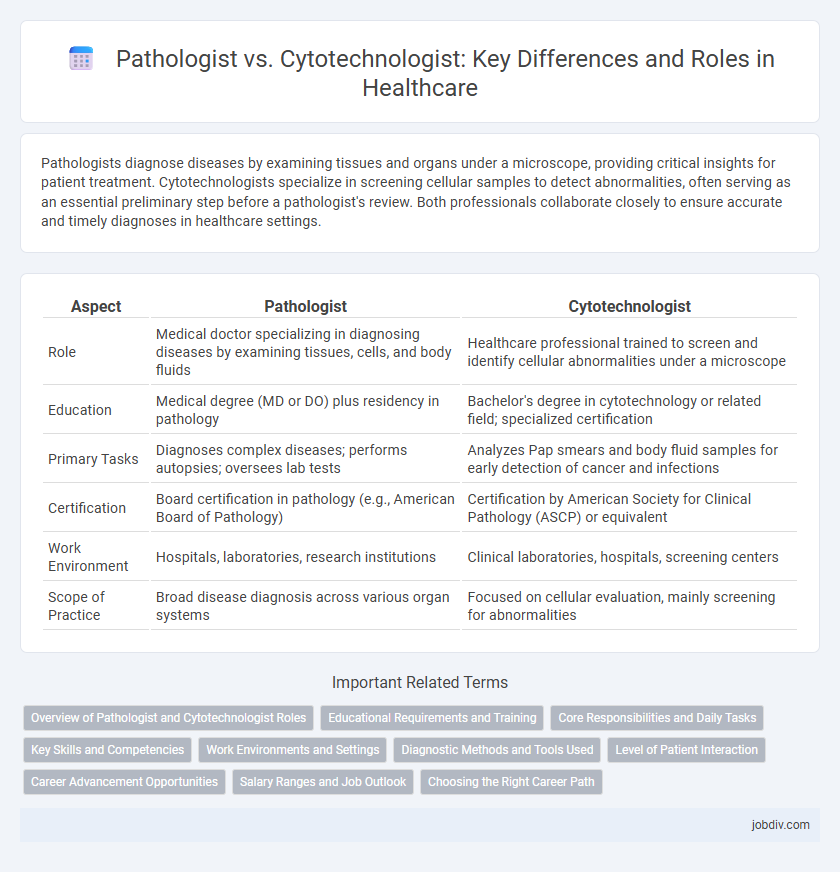Pathologists diagnose diseases by examining tissues and organs under a microscope, providing critical insights for patient treatment. Cytotechnologists specialize in screening cellular samples to detect abnormalities, often serving as an essential preliminary step before a pathologist's review. Both professionals collaborate closely to ensure accurate and timely diagnoses in healthcare settings.
Table of Comparison
| Aspect | Pathologist | Cytotechnologist |
|---|---|---|
| Role | Medical doctor specializing in diagnosing diseases by examining tissues, cells, and body fluids | Healthcare professional trained to screen and identify cellular abnormalities under a microscope |
| Education | Medical degree (MD or DO) plus residency in pathology | Bachelor's degree in cytotechnology or related field; specialized certification |
| Primary Tasks | Diagnoses complex diseases; performs autopsies; oversees lab tests | Analyzes Pap smears and body fluid samples for early detection of cancer and infections |
| Certification | Board certification in pathology (e.g., American Board of Pathology) | Certification by American Society for Clinical Pathology (ASCP) or equivalent |
| Work Environment | Hospitals, laboratories, research institutions | Clinical laboratories, hospitals, screening centers |
| Scope of Practice | Broad disease diagnosis across various organ systems | Focused on cellular evaluation, mainly screening for abnormalities |
Overview of Pathologist and Cytotechnologist Roles
Pathologists are medical doctors specializing in diagnosing diseases by examining tissues, organs, and bodily fluids through laboratory tests and microscopic analysis. Cytotechnologists focus on screening and identifying cellular abnormalities, often assisting pathologists by preparing and analyzing cell samples to detect cancers and other conditions at the cellular level. Both roles are crucial in clinical diagnostics, with pathologists providing definitive diagnoses and cytotechnologists enhancing early detection through detailed cellular examination.
Educational Requirements and Training
Pathologists require extensive medical education, including a Doctor of Medicine (MD) or Doctor of Osteopathic Medicine (DO) degree followed by a residency in pathology, emphasizing comprehensive clinical knowledge and diagnostic skills. Cytotechnologists typically complete a bachelor's degree in cytotechnology or a related biological science, followed by specialized training in laboratory techniques and cellular analysis, often culminating in certification by organizations like the American Society for Clinical Pathology (ASCP). The rigorous, multi-year training for pathologists contrasts with the focused, laboratory-centric education for cytotechnologists, reflecting their distinct roles in diagnosing diseases at cellular versus systemic levels.
Core Responsibilities and Daily Tasks
Pathologists analyze tissue samples and perform autopsies to diagnose diseases, interpreting laboratory results to guide treatment decisions. Cytotechnologists specialize in examining cell samples under microscopes to detect abnormalities and cancerous changes, often preparing and screening slides for pathologist review. Both roles require detailed microscopic analysis, but pathologists have broader diagnostic authority while cytotechnologists focus on early detection through cellular evaluation.
Key Skills and Competencies
Pathologists possess expert diagnostic skills in examining tissue samples and identifying diseases at the cellular level, relying on deep knowledge of histology and pathology techniques. Cytotechnologists specialize in screening and analyzing cell samples to detect abnormalities, requiring keen attention to detail, proficiency in microscopy, and understanding of cytology protocols. Both roles demand strong analytical abilities, precision, and familiarity with laboratory safety standards, but pathologists typically engage in more complex diagnostic decision-making while cytotechnologists focus on initial screening and sample preparation.
Work Environments and Settings
Pathologists primarily work in hospital laboratories, medical examiner offices, and academic institutions, where they analyze tissue samples and perform autopsies to diagnose diseases. Cytotechnologists are typically employed in clinical laboratories, cancer screening centers, and specialized diagnostic facilities, focusing on examining cell samples for abnormalities such as cancer detection. Both professionals operate in controlled, sterile environments equipped with advanced microscopes and diagnostic technologies essential for accurate specimen analysis.
Diagnostic Methods and Tools Used
Pathologists utilize histopathology, immunohistochemistry, and molecular diagnostics such as PCR and FISH to analyze tissue biopsies and diagnose diseases at a cellular and molecular level. Cytotechnologists specialize in examining cells from fluids and scrapings using microscopy and screening techniques like Pap smears and Liquid-Based Cytology to detect abnormalities. Both professionals rely on advanced imaging systems, staining methods, and laboratory information systems to ensure accurate and timely diagnostic results.
Level of Patient Interaction
Pathologists primarily analyze tissue samples and laboratory data with limited direct patient interaction, focusing on diagnosing diseases through microscopic examination. Cytotechnologists, on the other hand, prepare and screen cell samples, often working more closely with clinicians but still having minimal direct contact with patients. Both professionals play crucial roles in diagnostic processes, yet their interaction levels with patients differ significantly due to the nature of their tasks.
Career Advancement Opportunities
Pathologists typically have broader career advancement opportunities through specialized medical training and board certification, leading to roles in diagnostics, research, and academic medicine. Cytotechnologists advance by gaining expertise in cytology screening, pursuing certifications such as the American Society for Clinical Pathology (ASCP) Specialist in Cytotechnology credential, or transitioning into laboratory management. Both careers offer pathways to leadership positions, but pathologists generally access higher-level roles due to their medical degree and clinical responsibilities.
Salary Ranges and Job Outlook
Pathologists typically earn a salary ranging from $200,000 to $400,000 annually, reflecting their advanced medical training and diagnostic responsibilities. Cytotechnologists have a median salary of approximately $75,000 to $95,000 per year, with demand driven by the increasing need for cancer screening and diagnostic services. Job outlook for pathologists remains stable with moderate growth, while cytotechnologists are expected to see above-average job growth due to expanding roles in laboratory and screening technologies.
Choosing the Right Career Path
Pathologists and cytotechnologists both play vital roles in disease diagnosis, with pathologists focusing on comprehensive tissue analysis and cytotechnologists specializing in cellular sample evaluation. Individuals interested in a career requiring extensive medical education and diagnostic authority may prefer pathology, while those who enjoy detailed microscopic examination and laboratory work often find cytotechnology appealing. Career choice depends on factors such as desired education length, patient interaction level, and interest in research or clinical applications.
Pathologist vs Cytotechnologist Infographic

 jobdiv.com
jobdiv.com